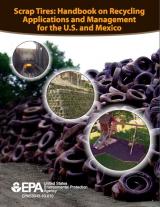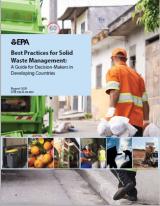Environmentally Sound Management of Waste: International Initiatives
EPA works to ensure that waste is managed in a manner that is protective of human health and the environment through a number of international initiatives. EPA’s efforts to sustainably manage waste include supporting the reduction and prevention of waste generation, promoting and facilitating the reuse and safe recycling of waste, and controlling imports and exports of hazardous waste between the United States and other countries.
On this page:
- OECD Working Party on Resource Productivity and Waste
- U.S. - Mexico Border 2020 Waste Program
- North American Initiatives on Food and Organic Waste
- Basel Convention Working Group
- Regulation of Transboundary Shipments of Hazardous Waste
- G7 Alliance on Resource Efficiency
- Solid Waste Management Guide
- Resources
Working Group on Resource Productivity and Waste of the Organization for Economic Cooperation and Development (OECD)
EPA collaborates with the Working Party on Resource Productivity and Waste Exit of the Organization for Economic Cooperation and Development (OECD) to tackle some of the most challenging issues regarding waste today, including the prevention and minimization of waste generation; removing barriers to recycling; the management of unavoidable waste in an environmentally sound and economically efficient way; and the control and streamlining of exports and imports of hazardous waste recyclables among OECD Member countries.
U.S. - Mexico Border 2020 Waste Program
EPA and the Mexican government are implementing the U.S. - Mexico Border 2020 Program, which includes goals to reduce and prevent land contamination through strengthened waste management. EPA provides resources to address waste management concerns along the U.S.-Mexico border.
Processing End-of-Life Vehicles: A Guide for Environmental Protection, Safety and Profit in the United States-Mexico Border Area
The End-of-Life Vehicle Guide and supplemental materials were created to help operators of vehicle dismantling and scrapping facilities understand and practice environmentally sound management of vehicles that have reached the end of their useful lives. This bilingual guide provides information on proper removal, storage and handling of potentially hazardous materials from discarded vehicles along the U.S.-Mexico border region.
The guide and supplemental materials form a packet which include:
- a guide on how to process end-of-life vehicles,
- six quick reference sheets for specific waste streams, and
- a poster providing a visual representation of the information.
Scrap Tires: Handbook on Recycling Applications
“Scrap Tires: Handbook on Recycling Applications and Management for the U.S.– Mexico"(PDF) (134 pp, 2.68 MB, About PDF)provides technical, environmental, economic and reference information for government and private industry. This resource can further efforts to clean up stockpiled scrap tires and prevent additional piles, assisting in the cleanup of border communities. The handbook is also available in Spanish (PDF) (132 pp, 2.57 MB, About PDF).
In February 2016, EPA in collaboration with the Centers for Disease Control and Prevention/Agency for Toxic Substances and Disease Registry and the Consumer Product Safety Commission launched a multi-agency Federal Research Action Plan on Recycled Tire Crumb Used on Playing Fields and Playgrounds to study key environmental and human health questions. For more information on this research effort, please visit the Federal Research Action Plan website.
North American Initiatives on Food and Organic Waste
EPA also participates in the Commission for Environmental Cooperation (CEC)’s North American Initiative on Food Waste Reduction and Recovery and the North American Initiative on Organic Waste Diversion and Processing. Through these initiatives, the CEC works to identify areas where the United States, Canada, and Mexico can reduce, recover, and divert food and organic waste before it arrives at a landfill or is incinerated. These efforts help prevent and reduce wasted food.
Basel Convention Working Group
EPA participates in the Basel Convention Open-Ended Working Group (OEWG), which provides technical guidance to support the implementation of environmentally sound management of hazardous waste shipments, especially in developing countries. The Working Group also assists Basel Parties on issues relating to policy, technical, scientific, legal and other aspects of implementation of the Convention. Although the United States is not a Party to the Basel Convention, implementation of Basel affects the U.S. economy. EPA’s involvement in the OEWG helps ensure that U.S. interests are represented at the Conference of the Parties (COP) to the Basel Convention.
Regulation of Transboundary Shipments of Hazardous Waste
EPA also works to ensure that transboundary shipments of hazardous waste are managed in an environmentally sound manner. When hazardous waste is shipped across multiple countries there can be a higher risk of mismanagement from unsafe transport, recycling and disposal practices. EPA requires importers and exporters to comply with regulations under the Resource Conservation and Recovery Act (RCRA) to help ensure that international shipments are handled safely in a manner that protects human health and the environment.
G7 Alliance on Resource Efficiency
As a member of the G7 Alliance on Resource Efficiency, EPA works with countries around the world to promote Sustainable Materials Management (SMM), share best practices, and reduce the amount of materials used while minimizing their environmental impact. In March 2016, EPA hosted a workshop on the Use of Life Cycle Concepts in Supply Chain Management to Achieve Resource Efficiency. For additional resources, visit the following:
- G7 U.S.-Hosted Workshop Summary Proceedings
- Observations and Opportunities for Action
- Our Actions for a Resource-Efficient Future: Following up G7 Progress on Toyama Framework on Material Cycles and 5-Year Bologna Roadmap
Solid Waste Management Guide
EPA developed the Best Practices for Solid Waste Management: A Guide for Decision-Makers in Developing Countries to share best practices with local decision makers in developing countries. The Guide covers a diverse set of important topics for city-level decision makers including stakeholder engagement, waste management planning and economics, waste collection and transportation, prevention, minimization, and recycling, landfill design and operation, and energy recovery. The Guide is designed to facilitate easy navigation between topics and external resources to help the reader find the information needed to address their solid waste management challenges.
Resources
- Directory of Waste Resources on the Web: The extensive map directory is organized with links to web resources for cross-national organizations; national governments; news services; associations; selected research organizations and projects; and selected agreements and policies.


